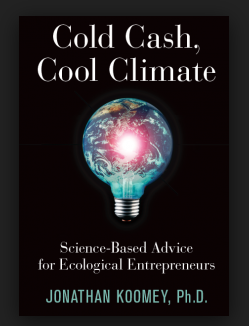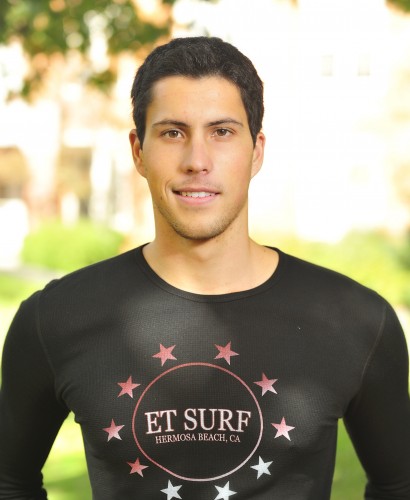
BLOG: Ecological Entrepreneurship: The Key to a Sustainable Future?
By Buck Doyle, MSEP ’16, and Christina Wildt, MSEP/MBA ’15
We are in an unprecedented time of economic development and social change, which has led to better living standards worldwide. But despite our capacity for technological advancement, we are actively pursuing a status quo that jeopardizes our future. With climate change looming and industries worldwide participating in greenhouse gas intensive practices, we must use innovation to engineer a more sustainable future.
Jon Koomey, author of “Cold Cash, Cool Planet: Advice for Ecological Entrepreneurs,” argues that entrepreneurship is the key to creating this future. “Scornful of the phrase ‘it can’t be done,’” he argues that ecological entrepreneurs uproot carbon intensive practices through innovation. This week, Koomey joined the National Climate Seminar sponsored by the Bard Center for Environmental Policy for a conversation about the potential of ecological entrepreneurship to forge a more sustainable future by undermining the present economic paradigm. Koomey is an energy and policy finance expert and holds an M.S. and Ph.D. from the Energy and Research Group at UC Berkeley. Author and coauthor of many books and hundreds of articles, he argues that entrepreneurship is the key to building a sustainable economy.
In order to achieve the emission reductions necessary to avoid catastrophic climate change, Koomey argues that we must fundamentally change current carbon intensive processes. Here, the role of entrepreneurship is to create products that “make people happy to scrap existing [carbon intensive] capital” by making products that are simply better than what they replace. For example, Patrick Sherwin of GoSun Stove has created a low energy solar powered stove that has the ability to replace carbon based stoves that release greenhouse gases. Koomey argues that innovators like this are not often found within the established corporate structure, and only by embracing such innovators can we transform the way that consumers impact the natural world.

Although we agree with Koomey about the essential role of entrepreneurship as a means to create a more sustainable future, we were curious about his opinions of the transformational potential of existing companies. What potential do current economic institutions have in building a sustainable economy? Koomey was skeptical about the commitment of established corporations to green innovation, explaining that there are businesses that benefit from the status quo. This inhibits their desire to innovate in the ways that entrepreneurs do. The role of the entrepreneur, therefore, is to disrupt the status quo. The GoSun Stove, for example, challenges the current fossil fuel paradigm. Koomey is “not sure that … large institutions will adopt this [entrepreneurial] framing for a long time.”
We agree with Koomey about the importance of disruptive innovation, but many companies large and small are evolving to meet the sustainability challenge, and we think Koomey may underestimate their ability to make progressive change. For example, Intel, one of the world’s leading tech developers, is also on the sustainability forefront. This tech giant has been the number one voluntary buyer of renewable power in the US since 2008 and is 100% carbon neutral starting this year. This is just one of countless examples.
Companies like Intel have demonstrated these sustainable capacities. Koomey is right in saying that ecological entrepreneurs are important innovators who are driving change, but transforming present industry is also pivotal to creating a sustainable future. There are industries that have a stake in business as usual, but there are also vast opportunities to innovate within existing companies. The reality is that climate change is urgent and unprecedented. The world cannot afford to place its faith in one group or institution, whether it is the government, corporations, or entrepreneurs. In order to achieve the emissions reductions necessary to avoid climate disaster, we must innovate at every level of society, government, and the economy.
Changing the future takes action at every level.
In order to create the change we need, entrepreneurial thinking should permeate all areas of our society, from startups, to corporations, to policymaking, and even individual action. At the end of our conversation, we asked Koomey to share how individuals can be part of building the sustainable future even if they are not entrepreneurs. He replied, “we need a lot more people who are willing to take responsibility for helping to solve problems.” Everyone has a role to play, whether by taking action within the home or workplace or by pressing corporations to craft sustainable products. By applying an ecological entrepreneurial approach at every level of society, we can build a sustainable future.
Join the National Climate Seminar live, it takes place via conference call the first and third Wednesday of each month during the academic year. Connect with top scientists, analysts, and political leaders to talk about climate change. Current schedule and past call synopses are online here.
Blog student authors: Christina Wildt and Buck Doyle


